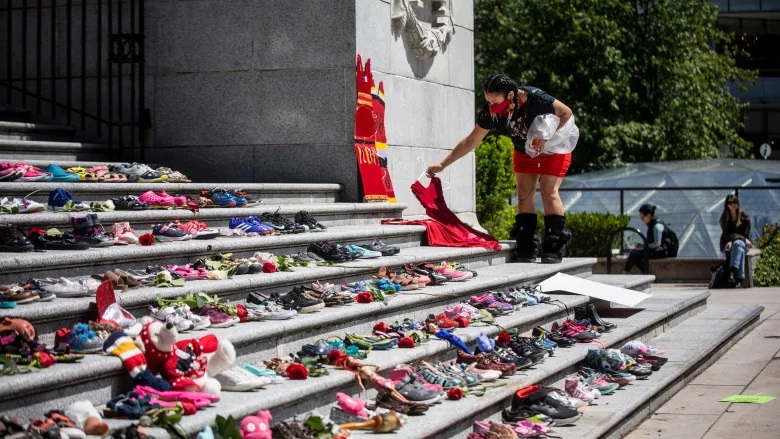KAMLOOPS (CANADA)
CBC (Canadian Broadcasting Corporation) [Toronto, Canada]
May 28, 2021
By Courtney Dickson
Group says federal government, Catholic Church need to move beyond words after remains of 215 children found
WARNING: This story contains details some readers may find distressing.
The Indian Residential School Survivors Society (IRSSS) is calling on the federal government and the Roman Catholic Church to take action following the discovery of the remains of 215 children buried on the Kamloops Indian Residential School grounds.
On Thursday, the Tk’emlúps te Secwépemc First Nation said preliminary findings from a ground-penetrating radar survey uncovered the remains. Since then, federal government officials and leaders have taken to social media and sent out news releases offering support.
The school was run by the Catholic Church from 1890 to 1969 when the federal government took over administration to operate it as a residence for a day school until it closed in 1978.
Prime Minister Justin Trudeau tweeted Friday that this discovery is “a painful reminder of that dark and shameful chapter of our country’s history” and offered thoughts and support.
Speaking for the Archdiocese of Vancouver, Archbishop J. Michael Miller told CBC News in an emailed statement that the findings fill him with “deep sadness.”
“The pain that such news causes reminds us of our ongoing need to bring to light every tragic situation that occurred in residential schools run by the Church. The passage of time does not erase the suffering that touches the Indigenous communities affected, and we pledge to do whatever we can to heal that suffering.”
‘Prayers only go so far’
Angela White, executive director for the IRSSS, said that both the church and the federal government need to take action.
“Reconciliation does not mean anything if there is no action to those words,” she said.
“Well-wishes and prayers only go so far. If we are going to actually create positive strides forward there needs to be that ability to continue the work, like the Indian Residential School Survivors Society does, in a meaningful way.”
The Truth and Reconciliation Commission (TRC) report from 2015 calls for the federal government to provide sustainable funding for existing and new Indigenous healing centres to address the physical, mental, emotional, and spiritual harms caused by residential schools.

Tk’emlúps te Secwépemc Kukpi7 (Chief) Rosanne Casimir has also expressed a desire for federal government accountability.
“It’s all well and good for the federal government to make gestures of goodwill and support regarding the tragedy,” Casimir said during an interview on CBC’s Daybreak Kamloops.
“There is an important ownership and accountability to both Tk’emlúps te Secwépemc and all communities and families that are affected. And that needs to happen and take place.”
Calls for Pope to respond
In a media release, IRSSS co-chair Rick Alec, a member of the Ts’kw’aylaxw First Nation, called for action specifically from the Pope.
“My Creator is asking their God why disciples would do this to us,” he said. “The Pope needs to answer this question. There is no more denying it. Now there is physical evidence from these unmarked graves.”
The TRC’s report also called upon the Pope to issue an apology to survivors, their families and communities for the church’s role in the abuse of First Nations, Inuit, and Métis children in Catholic-run residential schools.
In 2018, a letter from the president of the Canadian Conference of Catholic Bishops said Pope Francis can’t personally apologize for residential schools.
The IRSSS’s White said that if the Catholic Church apologized today for its involvement in residential schools across Canada, it would be meaningless, as they’ve had many years to make those apologies.
She said acknowledging the history and the reality of residential schools validates what survivors have been sharing for years and is an important part of the healing process.
Support available
Support is available for anyone affected by the lingering effects of residential schools, and those who are triggered by the latest reports. The IRSSS can be contacted toll-free at 1-800-721-0066.
A national Indian Residential School Crisis Line has been set up to provide support for former students and those affected. Access emotional and crisis referral services by calling the 24-hour national crisis line: 1-866-925-4419.
Within B.C., the KUU-US Crisis Line Society provides a First Nations and Indigenous-specific crisis line available 24 hours a day, seven days a week. It’s toll-free and can be reached at 1-800-588-8717 or online at kuu-uscrisisline.com.

